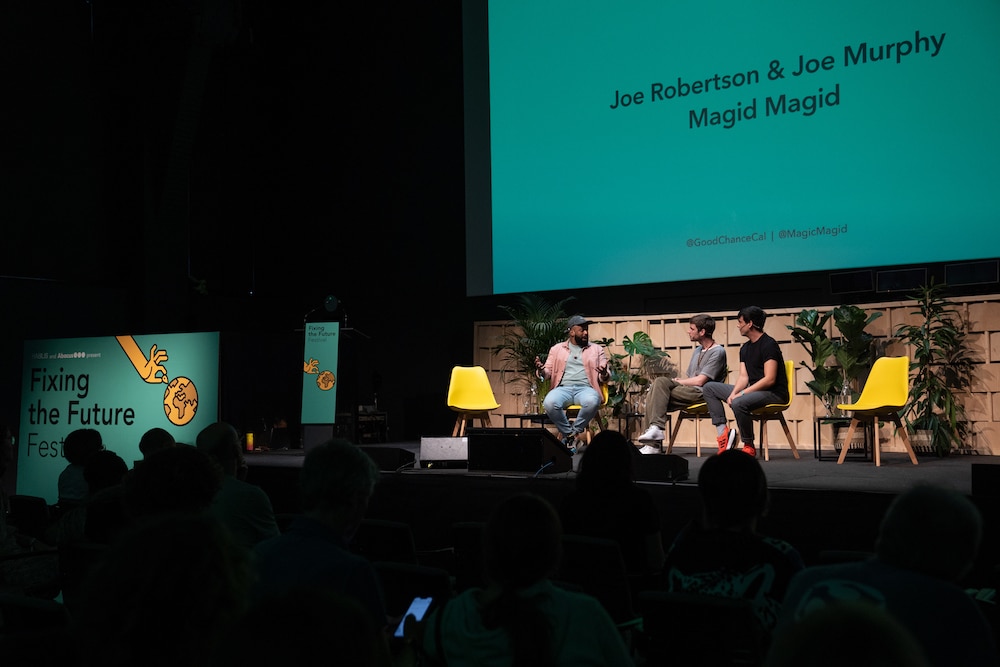United Kingdom (Sheffield )
“Use whatever god-given talent that you’ve got and just do something.”
Magid Magid, a Somali-British race and climate justice activist, knew there was something wrong when a school in his city of Sheffield closed due to air pollution. It was the first school in the UK to be officially closed due to the climate crisis. This, combined with the death of Ella Kissi-Debrah who was the first person in the world to have air pollution cited as a cause of death, was like a light bulb moment for Magid; the moment he realised you cannot separate the climate crisis from racial injustice.

Magid speaking at Fixing the Future festival 2022.
Looking for ways to contribute and find a solution, he found that many of the climate organisations were dominated by predominately white people who were not necessarily at the forefront of the climate crisis. Although he admired many of the activists, he found that the movement lacked representation. As he explained at Fixing the Future Festival 2022, “There were lots of different narratives that were missing from story of the climate crisis.”
He set out to make sure that in every conversation and at every table there was someone from a marginalised community present. With this in mind he set up Union of Justice, a European, independent, people of colour (POC) led organisation dedicated to racial justice and climate justice.
He challenged himself to reach out to 20 different people across Europe – ranging from researchers to academics to artists to elected politicians – to see if there was something they could do together. As Magid emphasises, “You can’t do things by yourself, change happens when you’re working collectively.” He was encouraged by the positive response, and began to build a network of people with different backgrounds who came from marginalised communities across Europe.
From the Union of Justice’s network of European activists, campaigners, researchers, artists, groups and changemakers, they facilitate training, mentoring, and capacity building support for those most affected, enabling them to bring about change in their communities. They also fill the knowledge gap by commissioning research on how climate crisis impacts marginalised communities (such as their research on environmental racism in Western Europe or their campaign for a more just European Green Deal).

Magid at Fixing the Future festival 2022.
Union of Justice is an advocate for positions and policies that contribute towards racial equality and climate justice, which means their views are not always well-received. “We don’t shy away from saying that we’re not a neutral organisation,” says Magid.
This approach can mean having difficult conversations with friends and family and it can antagonise some who are afraid of change or who hold onto the way things have always been done. Magid has no time for this, “Tradition is just peer pressure from dead people,” he says. But on a more serious note, he emphasises that authenticity is vital when challenging the status quo.
“We have to be very honest with who we are and bring our whole selves, because a lot of the time it can be easy to try and fit in and not want to be the person that’s going to stand out in the crowd and challenge.”
Magid sees change as possible – if the current system has been designed by people, then there is no reason why it cannot be redesigned – although it is not without its challenges; “We have to accept that we can’t please everybody.” But having these difficult conversations can provide some hope, in that people are at least engaged in the debate even if there is no consensus. He argues that even if people don’t agree, there needs to be some kind of truth-seeking process in which people can listen to one another.
The climate crisis is present everywhere and there is no time for inaction. As Magid says, “We need to have hope, but if there’s no action that comes with hope it just becomes a wish…A lot of the time when we think of the climate crisis we may think of something that’s happening really far away but if we look closely it’s really happening within our communities, with our friends; we can’t afford to not do anything.”
But it’s not about everyone going out with a placard and fighting on the streets; it’s about everyone finding their own area of influence. “We’ve all got some degree of influence; somebody might be a great baker, somebody might be a great writer. Use whatever god-given talent that you’ve got and just do something.”
AtlasAction: Join their training programme or donate. Or you can build your knowledge base with their bank of videos and extensive reading list.
Project leader
Magid Magid
Support the Atlas
We want the Atlas of the Future media platform and our event to be available to everybody, everywhere for free – always. Fancy helping us spread stories of hope and optimism to create a better tomorrow? For those able, we'd be grateful for any donation.
- Please support the Atlas here
- Thank you!

